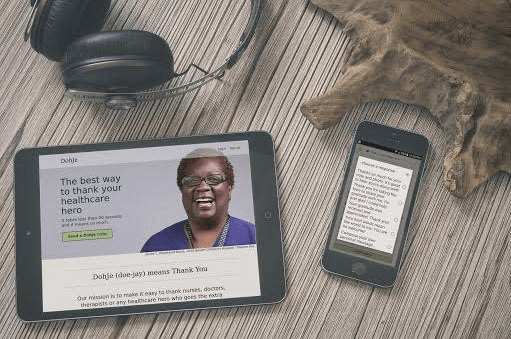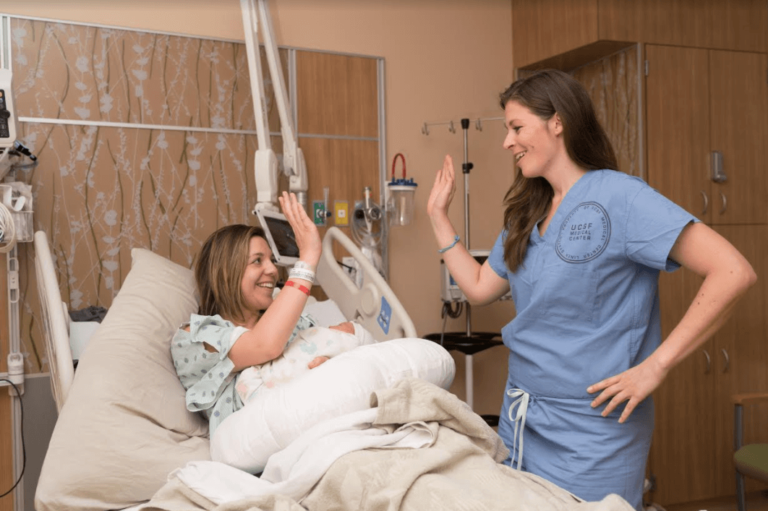This is a guest post from Amanda Krantz, Founder & CEO of DohJe, Inc. Find her on Twitter or LinkedIn.
Most of us have a story of a nurse or other healthcare worker whose kindness, expertise, or support made all the difference during a traumatic time. For me, that person was the nurse who helped me through a scary childbirth experience. After spending an embarrassing amount of time trying to figure out how to find her and thank her, I started DohJe, a tech company focused on making it easier for patients and peers to thank healthcare professionals, so that others could more easily reach out to nurses and extend that ever-important thanks.
So gratitude has become my passion. And after four years steeped in the healthcare industry, I’ve discovered the power of real gratitude when it comes to nurse job satisfaction and the need for the industry to move past current ‘rewards’ systems to something so much more meaningful.

The Science of Gratitude
First, the fact is that many patients are incredibly grateful and if we make it easy for them to express their gratitude, they will say incredible things. For instance, one patient recently sent this note through DohJe’s gratitude platform:
“Thank you for all the reassurance you provided when I was so scared about the bleeding I was having and for making sure the providers were always aware of what was going on. Also thank you for working hard when things started to progress to make sure I got to the OR as quickly as possible. I’m happy to report I have had an easy recovery and that [our baby] is doing wonderfully”
That is authentic gratitude. The person writing it didn’t need to be told what to say or encouraged with a reward. She knew exactly what she wanted to say. Nurses, who face increasing rates of burnout, can benefit from hearing these words; gratitude is motivating, inspiring, and can have lasting effects on your engagement and work performance.
Several gratitude studies confirm this—and, in fact, a new study being led by Harvard researcher Francesca Gino is exploring how DohJe’s gratitude platform affects job satisfaction, engagement, retention, and patient experience. While data is still being collected, the initial results are positive: In one hospital we work with, employees cited a significant increase in work satisfaction and used 761 fewer hours of sick leave (resulting in $22,000 in savings).
It comes down to a classic debate about what motivates people such as the intrinsic vs extrinsic rewards described in this Harvard Business Review study. Extrinsic rewards, such as points that can be redeemed for prizes, can actually demotivate the intrinsically motivated, which is not good–especially in healthcare. The intrinsically motivated are the superstar caregivers you can’t afford to lose.
” The deepest craving of human nature is the need to be appreciated. ”
— according to psychologist, William James.
Why Gamifying Gratitude Backfires
Research and real experience confirm that gratitude—authentic, heartfelt thanks—actually moves the needle for nurses, patients, and even hospital administration. And yet, many existing recognition systems rely on what I call “gratitude light.”
“Gratitude light” is the gamification of gratitude—transforming thanks about real events into a game with points. Thank a teammate, earn some points. Shoot, you might even win some steak knives if you do so. Encourage patients to say thanks or write a review to earn more points.
The problem with this type of gratitude is that it often dilutes the messages and leads to generic feedback. People are motivated to get the points, instead of catching people when they’re motivated by that strong feeling we all have of wanting to thank someone. These gamified comments are less than inspired. “The office was clean and I had very little wait time,” or “Thanks for the great service.”
This may be necessary in other industries. But in healthcare, there is no need to gamify gratitude—people are genuinely grateful to the people who helped them through a trying time, and saying thank you makes them feel better. They’re intrinsically motivated to do so, and the results are authentic thanks that actually mean something. Same goes for when you want to thank your co-workers for being there at just the right time.
Share Our Nurse Janice Video for a Chance to Win a Pair of Dansko Shoes
Working with hospitals across the country that have implemented DohJe, we’ve seen this authentic gratitude in action countless times. We created this video of a nurse at one of our hospitals to reveal the ripple effect that real gratitude can have—no points or steak knives needed.
From now until May 6th, you can share the video on Facebook, Twitter, or Instagram using #dohjeJanice (Janice is the nurse in the video!) to win a pair of Dansko shoes. You may also enter by sharing it in an email to your friends and CCing video@dohje.com. And by all means, reach out to us at support@dohje.com if you’re interested in learning more about how DohJe is bringing more gratitude to nurses every day.
About DohJe:
DohJe provides the best way for patients to directly thank their healthcare heroes and for caregivers to thank each other. The company was founded in 2013 with the vision of improving healthcare by making it easy for more people to share authentic gratitude from any phone, tablet, or compute. Clients include medical centers, community hospitals, senior living communities, and ambulatory care clinics.
